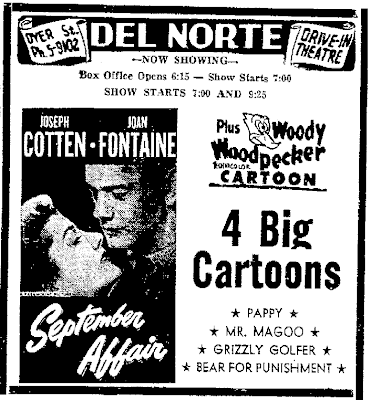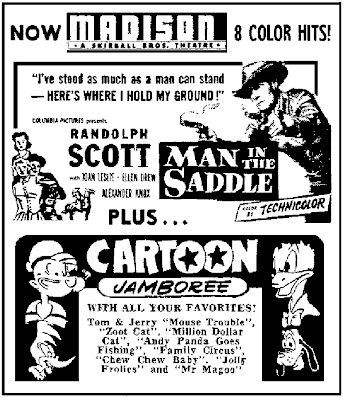Jack Benny did not slow down until the very end. He died on Boxing Day 1974 at the age of 80 and spent much of the year busy every day either with television, concerts, interviews or preparing for
The Sunshine Boys, the movie he never starred in.
We’ve posted several of Jack’s print interviews from that year here on the blog. Here’s another one from
Family Weekly, a weekend newspaper magazine supplement. It was published February 24th. Jack is asked about censorship, interesting in light of rigid inspection from the Hays/Breen office that films went through when he was making them. And he talks about why some of his long-running routines were retired and stopped appearing on his TV specials. His “Second Farewell Special” aired a month before this interview saw print..
Jack Benny 80 Talks About Jack Benny 39
By Peer J. Oppenheimer
The last time I saw Jack Benny was in his beautifully furnished, immaculate Beverly Hills mansion. This time I faced him across his cluttered desk in his Beverly Hills office. He turned 80 on Valentine’s Day, and we began talking about his proposed retirement.
FAMILY WEEKLY: Tell the truth now—could you ever think of yourself as not working?
BENNY: Let me put it this way. I could retire up to a certain point. And I’ll tell you what that point is. If I made a business of my concerts—and you know I give concerts for charity all the time—if I could do enough throughout the year, then I could probably retire. You see, I LOVE to play the violin. But I also love to get laughs. And I love to talk. So when I give a concert, I can do everything I do in Las Vegas. The difference is, the people who come to concerts are pretty sophisticated—the same people who maybe come to hear Isaac Stern, or Heifetz. In fact, Isaac Stern acts as an agent for me because he tells me where they need the money. I always say he gets ten percent of nothing.
FW: What do you think of today's permissiveness—particularly in movies?
BENNY: It's too bad. Producers are taking the easy way out. And the fact that the films are rated means nothing to me. I mean, either a picture should be permitted to be shown, or not, and not have an X rating or a G rating, or however they rate them.
FW: During the last election there was a Proposition 18 in California that, if passed, would have prohibited the showing of a lot of films. What did you think of that?
BENNY: I voted no because while don’t like obscene films, I don’t want censorship. Of any kind, anywhere. Otherwise someone can suddenly say, “Well, we don’t want this Jewish joke!” or “We don't want this Italian joke.” If a proposition like that went through, there's no telling how far censorship would go!
FW: As you grow older, are you growing more conservative?
BENNY: Not if conservative means stingy, careful with money. This I have never been. Neither has my wife. If I had, I should be the richest actor in show business. But politically—well, I am not a party man. I've never been a Democrat or a Republican. I don’t want to get hooked, I guess—I just want to vote for who is right.
FW: You say you aren't stingy. How did that joke start?
BENNY: By accident. In one of my old shows there were a couple of jokes about my being stingy. The audience laughed. A little later, when I did a weekly show, we used the same gag and it worked again. All of a sudden I became a stingy character. And then I realized how humorous it was, an element that is easy to laugh at. It’s easy to relate to.
FW: Has this ever gotten out of hand?
BENNY: Sometimes when I do guest shots, they plan on doing too much, and I’ll say, “Hey, wait a minute, fellas! I can’t be stingy throughout the entire show! There must be other things to do.” I’m so identified with it now that I don’t have to spell it out anymore.
For instance, on the Dean Martin show I walk into a restaurant and a reporter comes out and says there’s a big comet in the air and it’s going to hit the earth in about five minutes and the earth will be destroyed. I don’t say a word, but I go to the phone, and I say to the operator, “Who do I see? I just put a dime in the phone box . . . .” I don’t have to go any further. Just my going to the phone gets the laugh.
FW: Did anyone ever take your stinginess seriously?
BENNY: No. Everybody seems to know it’s a joke. But in order to compensate, it costs me a bloody fortune! Even with charities. I’m forced into giving a lot more than I can afford sometimes.
 FW
FW: How about your insistence that you are 39 years old? How did that get started?
BENNY: I kept the year 37 for a couple of years. When I was 38, I kept that up for about another three years. Then when I got to be 39, for some reason or other we thought 39 was a funny number. Also, a lot of little kids think that when you are 40, you are an old man. And who wants to be old?
FW: Did anyone ever object to your growing older than 39?
BENNY: Well, once we decided, for the publicity, to have a big 40th birthday. You can’t imagine the letters I received, including one from The Christian Science Monitor, begging me not to do it. The Monitor’s letter wasn’t humorously written, it was serious. They said that most people know my right age [Jack was born Benny Kubelsky on February 14, 1894]; but the people say, “Well, if Benny stays 39 and keeps working, I can keep on working, too!” So I stayed 39. But we don’t play that bit much anymore. Or the Maxwell car joke. That’s old stuff now—it's become corny.
FW: You don't look much older now than you did 20 years ago. How do you manage to stay in such good shape?
BENNY: Luckily I don't care much about eating. I love breakfast, but after that I can go on practically nothing. And I play golf—not as much or as well as I used to. But 1 think the most important thing is to do things mentally. I love to work.
FW: You once told me that one of the reasons you stayed young was because your grandchildren kept you young. Is that still the case?
BENNY: Maybe that was right at the time, but today I feel it’s my work that keeps me young. I like practically everything I do, and I don’t delve into myself. I don’t give a hoot how much people liked me on radio or in vaudeville. That’s gone. And when somebody asks me, “What did you like best, radio or television?” I say, “When I was in radio, I liked radio. But I couldn’t wait to get into television. If there is something after television, that’s what I will like!" You don’t live for yesterday or even today. You live for tomorrow.
FW: Did the fact that you and Mary worked together for such a long time help your marriage?
BENNY: Yes. But you know, it was quite by accident that we became a team. When I met her she was selling ladies’ hosiery at the May Company. In those days a lot of comedians would bring a girl out onstage to work for them. They were supposed to be dumb girls. All the comedians had dumb girls. Well, one day the one working for me became ill and Mary knew the part, and I said, "You know, you could do this beautifully!" And she did.
FW: After that, did you teach her a lot about the business?
BENNY: Mary’s knowledge about show business is absolutely amazing. She claims she learned certain things from me, which she probably did, but there are certain things that you instinctively have to do correctly to succeed. Like she would know enough not to try hard for jokes, that if it was written correctly on paper all she had to do was read it. That’s why Ronald Colman and his wife were great on my show. They were dramatic actors, but all they did was read the comedy lines exactly as they were written.



































